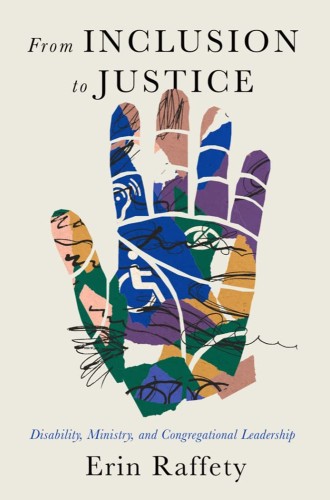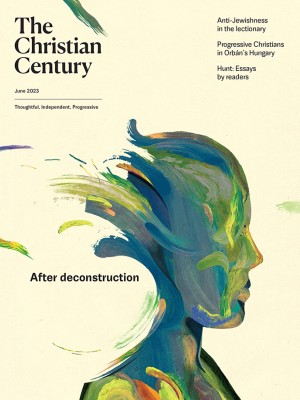Many congregations view disability as a problem to be solved with elevators, wider doors, or programs tailored for those with special needs. This approach misses the point, according to cultural anthropologist and Presbyterian minister Erin Raffety. The problem that should be addressed is not the perceived deficiencies of people with disabilities; it’s ableism.
Raffety believes that churches are steeped in societal prejudices against people with disabilities, and she calls Christians to repent and find radical new ways of thinking about disability. She shows how a new paradigm of ministry emerges from two ethnographic studies she conducted with families of people with disabilities and their congregations.
Read our latest issue or browse back issues.
Disability rights activists generally identify as disabled someone who has unique experiences due to bodily or cognitive differences and is in fact dis-abled—that is, their ability to do things is hampered—by idealized social norms. Raffety argues that the norms guiding how we operate as the church have been formed by the able-bodied human experience rather than the Christ-centered human experience.
Raffety, who has a daughter with multiple disabilities, confesses her own ableism in wishing for her daughter to be like herself—to live and love like her. Parenting a child with disabilities positions Raffety very close to her research, yet awareness and reflexivity are evident in her work. She recognizes that her desire for normalization, while it is well-intentioned, devalues the way people with disabilities experience and process the world. Disabled persons have much to offer as they are, she asserts, and God calls them into the life of the church (including ministry). She cites several studies, however, that have found families with disabled children far less likely to attend church than other families.
Raffety gleans examples from her fieldwork to demonstrate how ableism operates in churches today, including through interpretations of scripture. This section of the book is well argued: I imagine that preachers who read it will never preach the same way on Bartimaeus (Mark 10:46–52), the parables of the wedding banquet (Luke 14:7–14; Matt. 22:1–14; Luke 14:15–24), or the other biblical stories she discusses. For instance, she maintains that Bartimaeus is not simply an object Jesus acts upon. Rather, he is a partner in his own destiny, called into ministry by Jesus. Considerable damage has been done by a cult of healing that suggests to people with disabilities that if they only have enough faith they will be healed. Jesus is not a heroic healer; he’s one who proclaims love and aligns himself with those who suffer.
A common perception of churches that aren’t engaging in ministry with the disabled is that they do not have members with disabilities. Yet given the demographics of disability (and its invisibility in many cases), it is likely that these churches do have disabled members but don’t know it.
In conversation with the banquet parables, Raffety asserts that the solution to this dilemma is not inclusion, although inclusion is often considered a benchmark of good ministry. Inclusion merely shores up the power of the able-bodied: We allow you at the table. The banquet parables, she argues, call instead for a radical inversion, with a summons to those in power to face the consequences of their domination. Jesus was not just rearranging chairs to make room for more people; he was upending the table itself. The equity of the table lies not merely in the inclusion of the oppressed, who are already there whether we know it or not. The equity of the table lies in our repentance.
Stories from Raffety’s research suggest that listening and lamenting with people who are disabled can help us overcome the transactional ministry model (i.e., we do something for you). The aim of such listening, however, should not be to fix. It should be simply to come close to those who suffer and remain alongside them.
Raffety describes the practices of some congregations that utilize the gifts of people with disabilities, including the offering of separate worship services for families with disabled children. Many congregational leaders feel strongly that segregated ministry is exclusionary, with able-bodied people sequestering those who are disabled into a hidden-away place. But Raffety defends the existence of separate services, arguing that inclusive worship is often structured by ableist demands for conformity. Separate spaces for people with disabilities to gather can offer them the freedom to be who they are during communal worship. Able-bodied congregants can support and nurture these gatherings.
There is much to commend the points Raffety makes in her critique of inclusion. Still, the last part of the book left me saying, “Yes, but . . .” She stands in a long line with neoliberals in critiquing family systems theory because it pathologizes anxiety and is patterned on White, heteronormative thinking—in other words, it’s not inclusive. But this critique is rooted in the same inclusion model that Raffety finds inadequate. To dismiss systems theory out of hand seems excessive, as some of it has provided a useful lens to understanding congregations. All theory and research have their limits and shelf life. Perhaps more work needs to be done from a disability perspective to transvalue the theory and de-pathologize systems.
Raffety is correct that we must heed disabled leadership. Many denominations have the unenviable task of discerning whom the Spirit has called to ministry. It is not easy, and lives hang in the balance. How do we recognize and overcome the ideology of normalcy embedded in our discernment of the Spirit’s movement? “Misfitting,” as Raffety puts it, can expand our understanding of pastoral leadership—like the “elbows out” approach of a person in a wheelchair traveling through a crowd.
Raffety seems to suggest that we should all claim our own disability. That may help alleviate us-versus-them thinking, but I wonder if it also minimizes the different experiences and struggles of those with disabilities. Ableism must be challenged and dismantled in pursuit of the gospel, yet those of us who research and write about ableism generally do so within institutions structured by ableism. Is it possible not to be complicit? Let us hope that this volume does its part to upend the tables.






